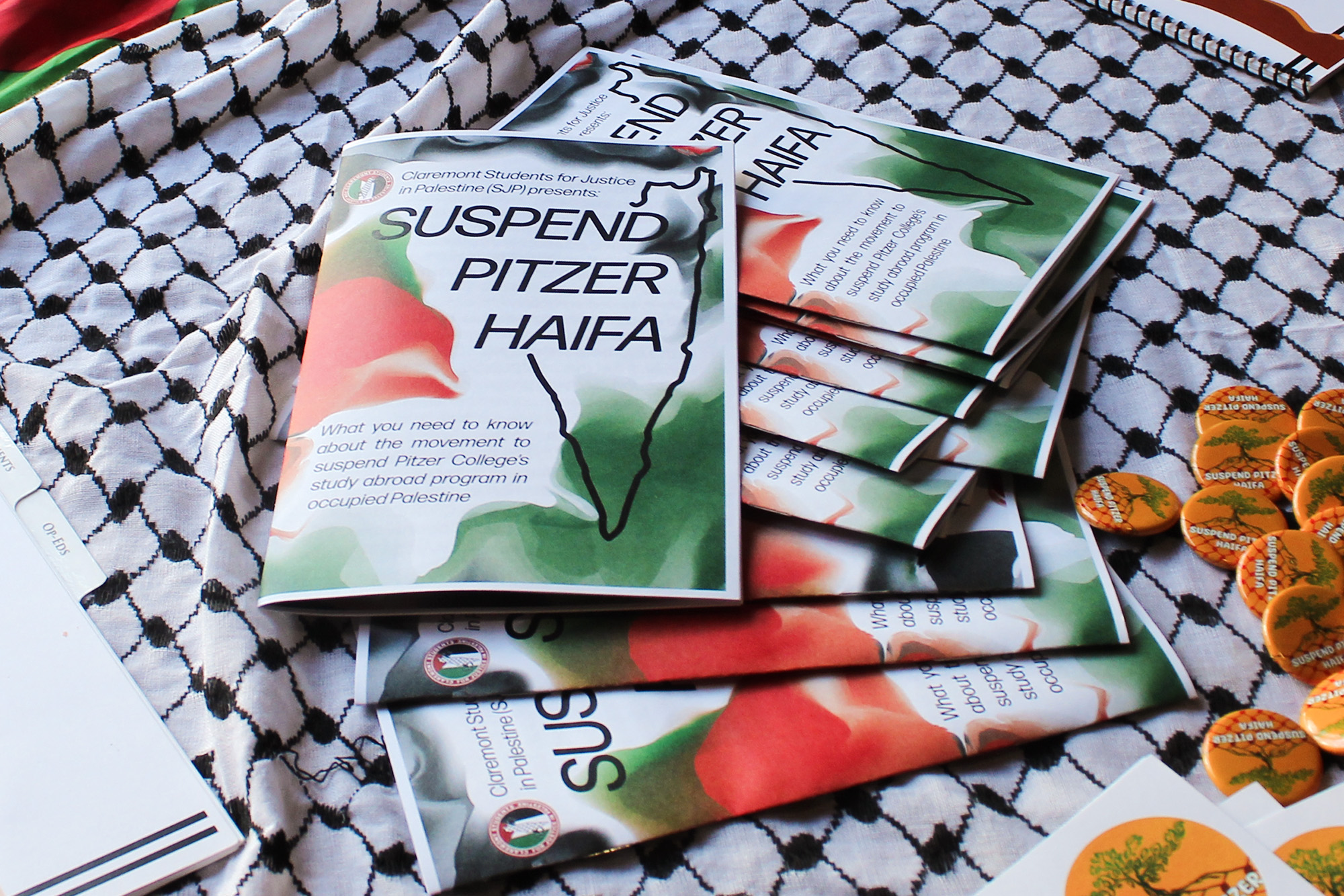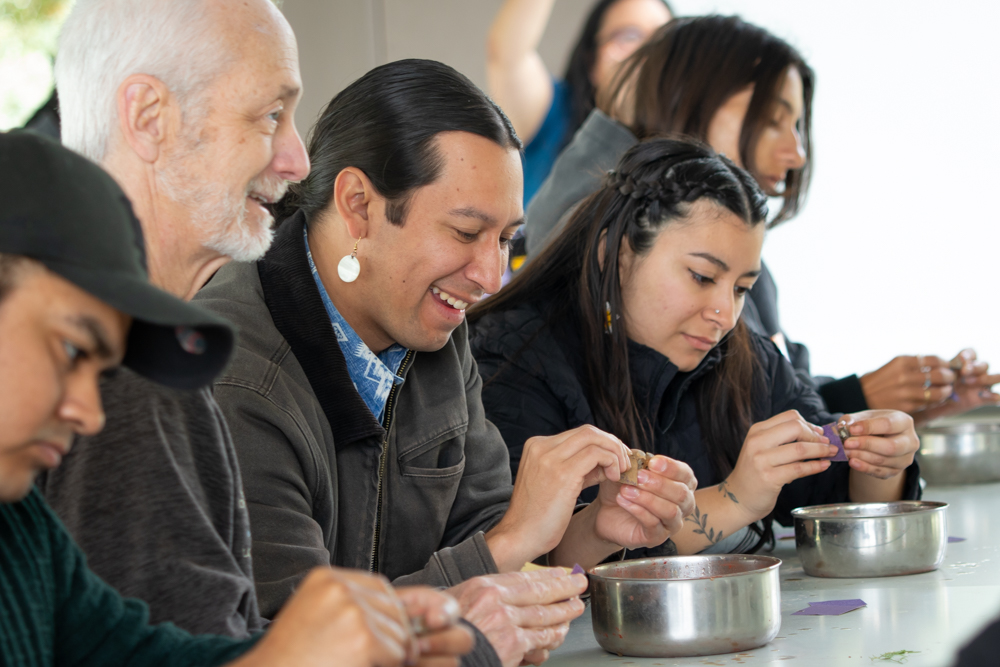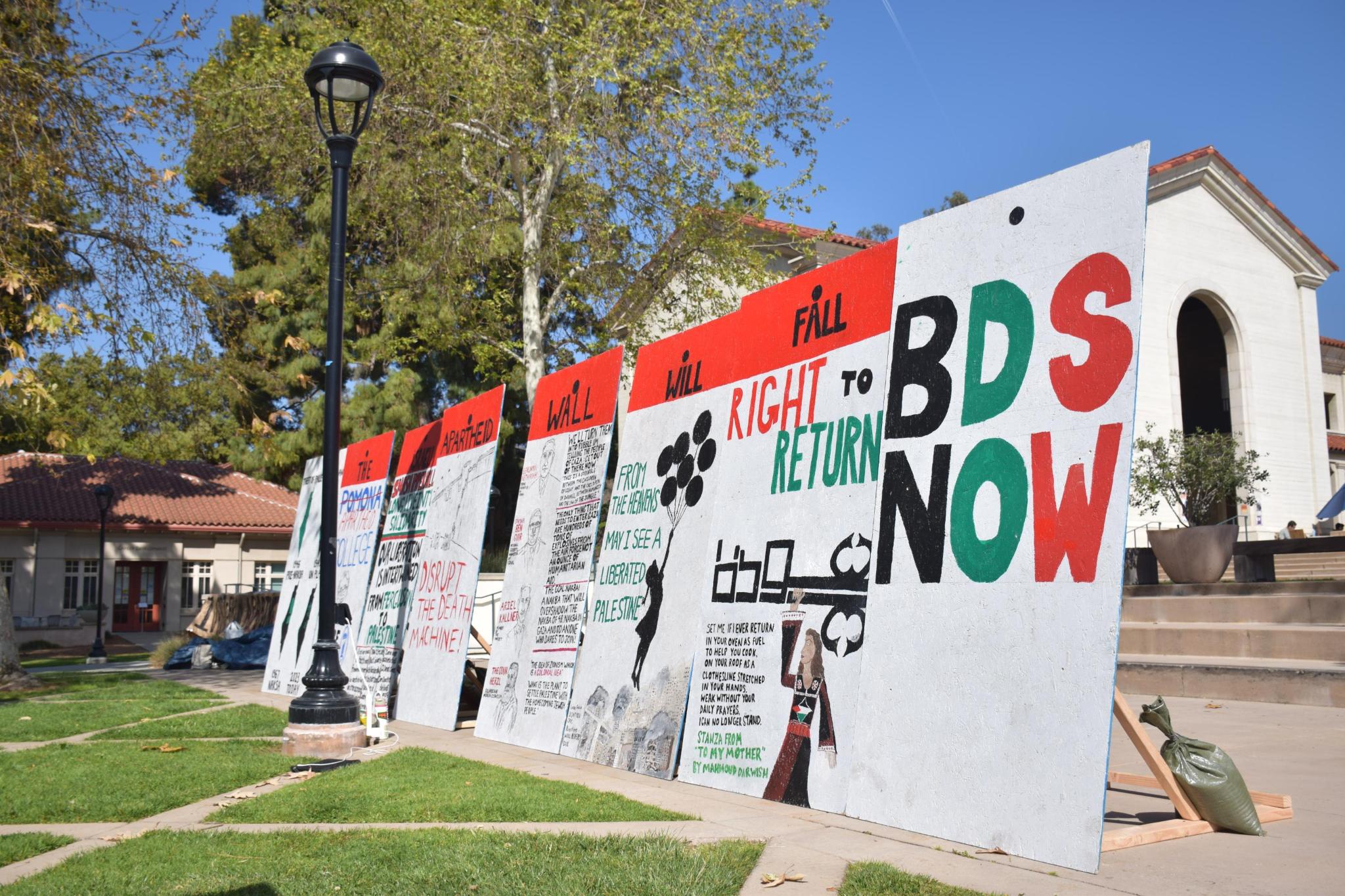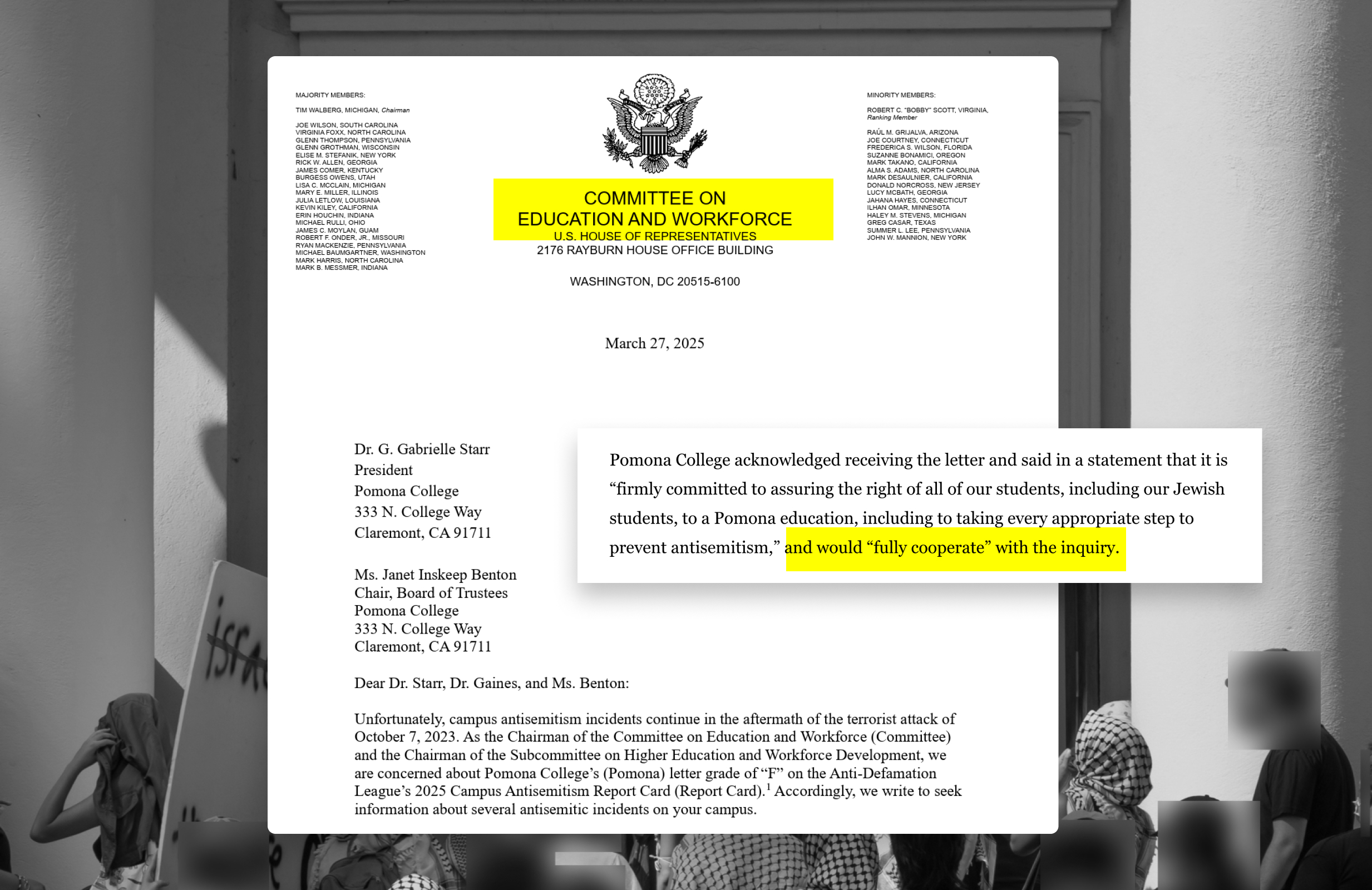
October 4, 2023
"In order to understand the Palestinian struggle, you must understand it through a framework...[of] settler colonialism."

A Habibi Funk album played through the speakers. Organizers passed out brightly colored zines. A whiteboard near the front of the room became a convenient place to hang a flag – red, black, white, and green, emblazoned with the text “FREE PALESTINE” and a raised fist.
Read also: SJP relaunches campaign to suspend Pitzer study abroad at University of Haifa in Israel (April 3, 2023)
This was the scene in Vita Nova Hall on Tuesday evening, September 19, as the room slowly filled. By 7:10 PM, there were more than 50 people present. All of us were there for Claremont Students for Justice in Palestine’s annual “Palestine 101” event, an hour-long introduction to the history of Palestine and the basis for SJP’s organizing on campus.
The atmosphere in the room was one of quiet concentration. Several students were taking notes as the four SJP organizers on stage moved through their slide deck. Perhaps the context of this year’s event made it particularly important. At the end of last school year, the group relaunched their campaign to suspend Pitzer’s study abroad program at the University of Haifa in Israel.
Working to support Palestine on college campuses in the United States is a high-stakes affair to begin with – all organizers present at the event asked Undercurrents not to publish their names due to concerns about retaliation – but SJP has particularly big plans for this year. “It’s important to educate every new class of people coming into the 5Cs,” an organizer told us, but that’s especially true “when we have such an important BDS campaign going on.”
Rather than jumping straight into the current campaign, though, the Palestine 101 curriculum started with background information. Quite a lot of it.
One of the first slides in the presentation presented a thesis. “In order to understand the Palestinian struggle, you must understand it through a framework that captures the historical processes that produced our current conditions,” it said. “That framework is settler colonialism.”
The organizers described settler colonialism as a process of conquest, not migration, meaning that it requires the displacement or removal of any indigenous population.
“In order to understand the Palestinian struggle, you must understand it through a framework that captures the historical processes that produced our current conditions … settler colonialism.”
SJP presentation
In order to demonstrate how this framework applies to Zionism and the settling of Palestine, the organizers took us through a history of the region, beginning with Ottoman rule and ending with the realities of life for Palestinians today. They discussed the Sykes-Picot era of British imperialism, the Balfour declaration and early push for Zionism, and the failed UN partition plan.
They talked about the Nakba, the Six-Day War, and both Intifadas. A key point in all of this was Israel’s ongoing effort to create and maintain a “Jewish majority” – the maximum possible number of Jews on the maximum possible amount of land. (The slides used for Palestine 101 are available online at this link.)
As the slide deck approached the present day, we discussed the use of the label “apartheid.” Organizers referred to the definition developed at the 1973 United Nations International Convention on the Suppression and Punishment of the Crime of Apartheid, which defines apartheid as “inhuman acts committed for the purpose of establishing and maintaining domination by one racial group of persons over any other racial group of persons and systematically oppressing them.”
They pointed to numerous examples of this type of action by the Israeli government, including a system of segregated roads in Israel and the occupied Palestinian territories as well as discriminatory laws and strategic fragmentation of Palestinians into different geographic and legal categories – not to mention the ongoing blockade of Gaza.
They pointed to numerous examples of apartheid by the Israeli government, including a system of segregated roads in Israel and the occupied Palestinian territories as well as discriminatory laws and strategic fragmentation of Palestinians into different geographic and legal categories – not to mention the ongoing blockade of Gaza.
“All of that brings us to why we’re here today,” an organizer stated forty minutes into the presentation, and the focus quickly shifted to action. We were informed that each year at least 3.8 billion dollars are sent from the U.S. to Israel as military aid. “Our tax dollars are going to that,” the speaker reiterated, making audience members audibly cringe.
The presentation introduced the acronym BDS (Boycott, Divestment, and Sanctions), a key focus of SJP’s organizing based on a 2005 call from Palestinian civil society. The BDS movement seeks to boycott “all Israeli and international companies engaged in violations of Palestinian human rights,” as well as “complicit Israeli sporting, cultural and academic institutions.” It also aims to encourage institutional divestment from the same, and to impose international sanctions on the state of Israel.
All of these strategies are intended to support three main demands: ending the Israeli occupation and colonization of the Palestinian territories, granting full equality to Palestinian citizens of Israel, and protecting the rights of Palestinian refugees to return to their home.
Then it was finally time to talk about the Suspend Pitzer Haifa campaign. Organizers emphasized that while Suspend Pitzer Haifa is a BDS effort, Pitzer’s study abroad program at the University of Haifa is not being targeted simply because it is in Israel. They said that the university has ties to the Israeli government and military, and that Palestinian students at Pitzer would likely be unable to attend the program due to Israel’s discriminatory policies.
The current Suspend Pitzer Haifa campaign is a relaunch of a 2018-2019 campaign with the same goal, which would have been successful if not for a veto by former Pitzer President Melvin Oliver. In March of 2019, the Pitzer College Council of faculty, students, and staff voted 67 to 28 to suspend the Haifa program, an overwhelming majority in favor of the suspension.
In March of 2019, the Pitzer College Council of faculty, students, and staff voted 67 to 28 to suspend the Haifa program, an overwhelming majority in favor of the suspension.
Oliver vetoed the decision a few hours later in a rare override of the College Council, which technically makes non-binding recommendations to the President but is typically treated as a decision-making body. The Executive Board of Pitzer’s Student Senate described the veto as “antithetical to shared governance” and “a fundamental threat to student, faculty and staff voice.”
The outrage on campus that followed only escalated when Oliver flew to Israel in May to reaffirm support for the Israeli government and opposition to BDS. “To boycott a country on the basis of their policies is by definition a blanket indictment of the nation itself, and by extension its citizens,” he declared at the University of Haifa’s annual board of governors meeting. University of Haifa President Ron Robin then presented him with the “Hamsa Hand” award, in honor of his “inspired leadership.”
The outrage on campus that followed only escalated when Oliver flew to Israel in May to reaffirm support for the Israeli government and opposition to BDS.
The Student Senate called for Oliver to reverse the veto, although a proposal to call for his resignation was voted down; he retired at the close of the 2021-22 academic year. Now that Strom Thacker has officially stepped into office as President, SJP hopes that the campaign will meet less resistance from Pitzer’s leadership.
SJP organizers feel a deep sense of responsibility. “As Americans, or students at American universities, we are tied to the Israeli settler colonial state,” one organizer told us after the event. “Our tax money and our institutions’ money is tied up in the occupation and the oppression of Palestinians. So it matters that we pay attention to what’s happening and we work toward Palestinian liberation.”
The Suspend Pitzer Haifa campaign is just one of the ways SJP hopes to work toward that goal. They also host educational and cultural events throughout the year, and coordinate other Boycott, Divestment, and Sanctions efforts on campus. Organizers noted their excitement about the resurrection of Jewish Voice for Peace on campus this year, hoping to continue the two groups’ history of collaboration.
But suspending the study abroad program in Haifa is a key focus for this year. “This would be an extremely, extremely historic win,” organizers told the crowd, with no known precedent on any other college campus.
But suspending the study abroad program in Haifa is a key focus for this year. “This would be an extremely, extremely historic win,” organizers told the crowd, with no known precedent on any other college campus.
As SJP organizers work to finalize a bill they will submit to Pitzer’s Faculty Executive Committee calling for the suspension of Pitzer Haifa, they hope students and faculty at the Claremont Colleges will get involved.
“We want faculty support for suspending Pitzer Haifa, and we want [President Strom Thacker] to listen to students, faculty, and the 5C community at large – especially because Pitzer claims to care so deeply about students’ values and beliefs,” organizers said.
Claremont Students for Justice in Palestine meets on Tuesdays at 8:00 PM in the Motley Coffeehouse. More information can be found on their website, and via Instagram @claremontsjp. Maya Olson PZ ‘25, editor-in-chief of The Outback, contributed reporting for this article.
Ezra Levinson PZ ‘27 (any pronouns) is a student at Pitzer College. Ezra covers organizing in and around the Claremont Colleges, with a particular interest in efforts to connect the colleges with the broader local and global community. Their current focuses include Palestinian and Jewish organizing as well as labor struggles.
Sophie Myers PZ ‘27 (she/her pronouns) is a student at Pitzer College interested in the various Leftist movements at the Claremont Colleges and their intersections. She’s especially interested in the 5C Divest Movement and other climate activism, efforts to radically transform our prison system, and how students at the 5Cs can most effectively create the change they wish to see in their communities.


Affinity groups

Palestine

Palestine

Undercurrents reports on labor, Palestine liberation, prison abolition and other community organizing at and around the Claremont Colleges.

Issue 1 / Spring 2023
Setting the Standard
How Pomona workers won a historic $25 minimum wage; a new union in Claremont; Tony Hoang on organizing
Read issue 1